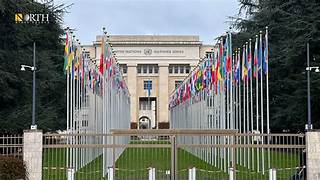The Syrian Ministry of Foreign Affairs has clarified that the recent adjustment to the status of Syria’s diplomatic mission in New York is purely a technical and administrative measure tied to the previous delegation and does not signal a shift in the U.S. position toward Syria’s new government.
A Foreign Ministry source told the state news agency SANA that Damascus remains in ongoing communication with the relevant parties to resolve the issue and clarify the full context “to avoid any political or legal misinterpretation.” The source reaffirmed Syria’s commitment to continuing its diplomatic work and international coordination “to fulfil the aspirations of the Syrian people in rebuilding their homeland.”
The ministry further confirmed that a comprehensive review of Syrian diplomatic missions abroad is currently underway and that new decisions will soon be announced to reorganize and restructure these missions. The goal, the source said, is to better reflect the Syrian people’s aspirations, enhance institutional presence on the international stage, and ensure both efficient performance and clear political representation.
Earlier, the United States officially informed Syria’s delegation to the United Nations of a change in its legal status—from that of a permanent mission of a recognized state to a mission representing a government not recognized by Washington. The notification came in the form of a formal memorandum delivered through UN channels.
According to a report by Lebanon’s An-Nahar, citing internal documents, the U.S. memo stated that G1 diplomatic visas—granted to envoys of recognized governments—would be revoked and replaced with G3 visas, which are issued to representatives of governments not recognized by the United States.
The Syrian Foreign Ministry received a copy of the memorandum, along with an unofficial translation, via its delegation in New York. The notice specified that the U.S. Citizenship and Immigration Services (USCIS) would handle the issuance of new visas once the necessary procedures are completed.
The American move has sparked concern within the Syrian delegation, which warned in an official cable that the reclassification could set a precedent encouraging other countries to take similar steps—thus creating diplomatic ramifications that extend well beyond a mere administrative matter.
Former Syrian diplomat Jihad Makdissi commented that the decision carries clear political implications. He noted that the leak of the U.S. memo to the media was no coincidence, but rather a direct message regarding the legitimacy of the current Syrian delegation in New York.
Makdissi pointed out that the UN Credentials Committee—elected annually by the General Assembly—has the authority to reassess the legitimacy of delegations, particularly in the wake of fundamental political changes, such as the fall of Syria’s previous regime.
According to Makdissi, the committee has already moved to change the legal status of Syria’s current diplomats, requiring them to apply for temporary residency permits without diplomatic privileges while a final decision is made on the delegation’s accreditation.
In a post on X (formerly Twitter), Makdissi emphasized that the change does not affect representatives of the new Syrian government, who have already begun receiving their official assignments. He stressed that most countries now deal with the new administration as Syria’s sole legitimate authority.
He added that this latest U.S. action sends a clear message: Washington no longer recognizes the delegation of the deposed regime and is awaiting the procedural completion of the new government’s official representation at the UN.
Makdissi concluded by noting that Syria’s new leadership faces complex legal and bureaucratic hurdles in establishing its diplomatic standing, especially as some states attempt to exploit the transitional period to impose political conditions. “The road ahead for the new government is far from easy,” he wrote, “but it has undeniably begun moving in the right direction.”
This article was translated and edited by The Syrian Observer. The Syrian Observer has not verified the content of this story. Responsibility for the information and views set out in this article lies entirely with the author.


